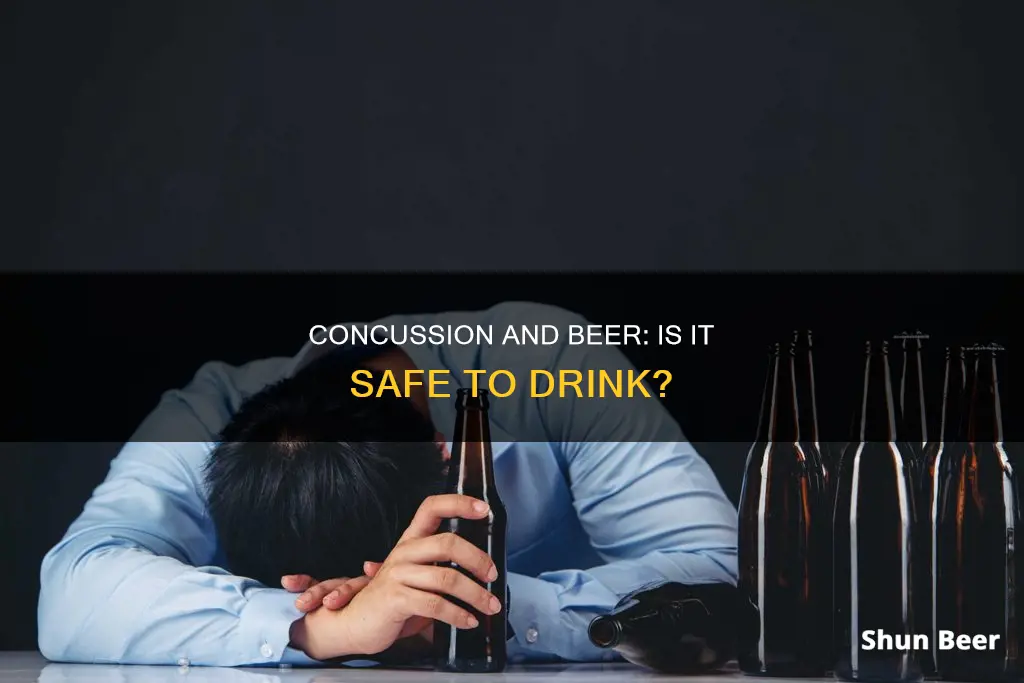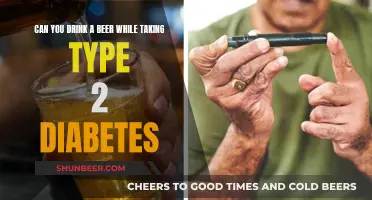
Drinking alcohol when you have a concussion is not recommended. Alcohol is a central nervous system depressant, which disrupts the brain's ability to function at full strength. It can also increase the severity of a concussion's after-effects, such as dizziness, headaches, and nausea. Furthermore, alcohol may slow down recovery from a concussion, as it can prolong inflammation and disrupt communication between brain cells. It is best to avoid alcohol until all symptoms of a concussion have resolved, and to consult a doctor before drinking again.
| Characteristics | Values |
|---|---|
| Drinking alcohol after a concussion | Not recommended by medical professionals |
| Alcohol's effect on the brain | Alcohol is a toxin that can cross the blood-brain barrier and directly affect neurons |
| Alcohol's effect on concussion recovery | Alcohol may slow down recovery and increase the chance of another injury |
| Alcohol's effect on symptoms | Alcohol can increase the severity of symptoms such as dizziness, headaches, and nausea |
| Alcohol's effect on brain function | Alcohol disrupts communication between neurons in the brain and alters hemodynamics (blood flow patterns) |
| Alcohol's effect on seizures | Alcohol may increase the risk of seizures and can trigger them |
| Alcohol's effect on cognitive function | Alcohol may worsen cognitive problems such as memory and flexible thinking |
| Alcohol's effect on mental health | Alcohol can increase the risk of depression and other emotional problems |
| Alcohol's effect on sleep | Alcohol can interfere with sleep quality, which is important for recovery |
| Alcohol's effect on balance and coordination | Alcohol can worsen balance issues and impair motor coordination |
What You'll Learn
- Alcohol may worsen symptoms of a concussion, such as dizziness, nausea, headaches and blurred vision
- Drinking alcohol after a concussion may increase the risk of further injury
- Alcohol can slow down or stop recovery from a concussion
- Alcohol can increase the risk of seizures in people with a Traumatic Brain Injury (TBI)
- Alcohol can make symptoms of depression worse after a concussion

Alcohol may worsen symptoms of a concussion, such as dizziness, nausea, headaches and blurred vision
Drinking alcohol after a concussion is not recommended. While there is little research on how alcohol affects concussion recovery, it is a toxin that can cross the blood-brain barrier and directly affect neurons. Alcohol also slows down nervous activity in the central nervous system, which includes the brain.
Research indicates that consuming alcohol while recovering from a concussion can worsen symptoms such as dizziness, nausea, headaches, and blurred vision. Alcohol may also prolong inflammation and disrupt communication between brain cells, limiting the extent of recovery. As such, it is best to avoid alcohol until all symptoms have resolved and a doctor has given the all-clear.
Alcohol can also increase the risk of further injury. It impairs normal inhibition, alters motor control, and disrupts sleep, all of which increase the risk of falls and accidents. Alcohol also affects judgment, balance, and coordination, and can trigger seizures in those at risk.
Additionally, alcohol may affect individuals differently after a concussion. Some may experience an increase in symptoms such as headache, nausea, dizziness, and sensitivity to light and noise. Others may sleep excessively, masking the negative effects of alcohol. Some may also be more sensitive to alcohol while healing from a concussion, which can lead to dangerous levels of intoxication.
In summary, alcohol may worsen symptoms of a concussion, such as dizziness, nausea, headaches, and blurred vision. It can also prolong recovery, increase the risk of further injury, and affect individuals differently. Therefore, it is best to abstain from alcohol until fully recovered from a concussion.
Beer Before Bed: Why You Can't Sleep
You may want to see also

Drinking alcohol after a concussion may increase the risk of further injury
Drinking Alcohol After a Concussion: What You Need to Know
A concussion is a mild traumatic brain injury (mTBI) that occurs when the brain collides with the skull due to an external force. This injury can cause temporary inflammation and disruption to the brain's communication pathways, leading to symptoms such as headaches, dizziness, and sensitivity to light and sound. So, what happens if you drink alcohol after a concussion? Is it safe, or can it increase the risk of further injury?
Alcohol's Impact on the Brain
Alcohol is a central nervous system (CNS) depressant, which means it slows down nervous activity in the brain. This disruption can have a significant impact on brain function, including impulsivity, decision-making, memory, and coordination. Additionally, alcohol is a neurotoxin, which means it has the potential to damage brain cells.
The Risks of Drinking After a Concussion
Drinking alcohol after a concussion is not recommended as it can increase the risk of further injury and impair the healing process. Here are some of the specific risks associated with consuming alcohol while recovering from a concussion:
- Increased Risk of Injury: Alcohol can alter motor control and impair normal sleep, increasing the risk of falls and accidents, which may lead to another head injury.
- Prolonged Inflammation: Alcohol use can prolong inflammation in the brain and disrupt communication between brain cells, hindering the recovery process.
- Worsening of Symptoms: Alcohol consumption can worsen existing concussion symptoms such as dizziness, nausea, headaches, and blurred vision.
- Increased Sensitivity: During the recovery period, individuals may find that their tolerance for alcohol has decreased, and they may be more sensitive to its effects, leading to faster intoxication.
- Interference with Medications: Alcohol may interact with prescription medications, including antidepressants and painkillers, reducing their effectiveness or increasing their side effects.
- Risk of Seizures: Individuals with a traumatic brain injury (TBI) are at risk for seizures, and alcohol consumption may increase the likelihood of having seizures or trigger them.
- Cognitive Problems: Alcohol can worsen cognitive issues related to a concussion, such as concentration, memory, and learning.
- Mental Health Issues: Drinking alcohol after a concussion can increase the risk of emotional problems such as depression and affect an individual's ability to make decisions.
Guidelines for Drinking After a Concussion
While there are no standardized guidelines on alcohol consumption after a concussion, it is generally recommended to abstain from drinking until all symptoms have resolved and a doctor has given clearance. Even then, it is crucial to drink in moderation and be aware of any lingering effects of the concussion.
Dogs and Beer: Can It Make Your Pup Sick?
You may want to see also

Alcohol can slow down or stop recovery from a concussion
Alcohol is a central nervous system (CNS) depressant. It slows down nervous activity in the central nervous system's organ, the brain. When you have a concussion, your brain needs time to heal. As such, you need to rest and avoid activities that strain the brain or affect its functioning.
Alcohol consumption can negatively impact recovery from a concussion in several ways. Firstly, it can directly impede the healing process by disrupting communication between neurons and altering hemodynamics (blood flow patterns across the brain). This disruption can make it more challenging for the brain to heal, potentially slowing down or stopping recovery.
Secondly, alcohol can increase the severity of concussion symptoms such as dizziness, headaches, nausea, and blurred vision. These symptoms not only cause discomfort but also raise the risk of further injury by increasing the chances of falls or accidents. Additionally, alcohol consumption can prolong inflammation and disrupt communication between brain cells, further hindering the recovery process.
Furthermore, alcohol may increase your sensitivity to its effects during the recovery period. This heightened sensitivity can lead to faster intoxication and potentially dangerous levels of intoxication more quickly. It can also affect your judgment, balance, and coordination, putting you at a higher risk of sustaining another head injury or experiencing seizures.
The consumption of alcohol after a concussion can also lead to an increased risk of emotional problems such as depression. It can worsen cognitive problems related to concentration, problem-solving, memory, and learning new information. Additionally, it can affect mobility, balance, speech, and fatigue.
To ensure a healthy and optimal recovery, it is best to refrain from alcohol consumption until all concussion symptoms have resolved and you have consulted with your doctor for a final assessment. Giving your brain a clean environment to heal and avoiding activities that impede healing are crucial for a successful recovery.
Tongue Piercing and Beer: What's Safe?
You may want to see also

Alcohol can increase the risk of seizures in people with a Traumatic Brain Injury (TBI)
Drinking alcohol after a concussion is not recommended. Alcohol is a central nervous system (CNS) depressant, which means it slows down nervous activity in the brain. This disruption can have a negative impact on the brain's ability to heal, which is especially important after a concussion.
People with Traumatic Brain Injuries (TBIs) are at risk of seizures, and drinking alcohol may increase this risk. Alcohol withdrawal is also a common trigger for seizures, and it is possible for chronic alcohol consumption to cause seizures in people without a history of them.
Alcohol may also negatively affect sleep, and sleep disruptions can trigger seizures. Alcohol can also interact with anti-seizure medications, making them less effective or worsening their side effects.
Additionally, alcohol increases the risk of concussions and TBIs. It impairs normal inhibition, alters motor control, and affects sleep, all of which increase the likelihood of a concussion. It is estimated that up to 50% of head injuries in the US and 65% in the UK are alcohol-related.
Therefore, it is advisable to refrain from drinking alcohol while recovering from a concussion or TBI to give the brain the best chance to heal and reduce the risk of seizures and further injuries.
One Beer, No Buzz: Factors Affecting Alcohol Absorption
You may want to see also

Alcohol can make symptoms of depression worse after a concussion
Alcohol and Concussions: What You Need to Know
Overview
When it comes to drinking alcohol after experiencing a concussion, medical professionals generally advise against it. This is because alcohol can negatively impact the healing process and increase the risk of further injury. However, the decision to consume alcohol during concussion recovery is ultimately up to the individual. Here, we will explore the specific reasons why alcohol consumption is not recommended, with a particular focus on its potential to worsen symptoms of depression.
Alcohol and Brain Injuries
Alcohol is known to alter brain chemistry, affecting our mood and emotions. It is a neurotoxin, which means it has the potential to damage brain cells. When combined with a traumatic brain injury (TBI), even moderate alcohol consumption can have detrimental effects on the healing process. The Brain Injury Association of America cautions against alcohol consumption following a brain injury, as it can impair recovery and increase symptoms of depression.
Alcohol's Impact on Depression
Depression is a common mental health issue that can arise after a concussion, and alcohol consumption can exacerbate this condition. Research has shown that depression is about eight times more common in the first year after a TBI than in the general population. Alcohol use can trigger or worsen depressive symptoms, and it may also reduce the effectiveness of antidepressant medications. This means that individuals taking antidepressants should refrain from consuming alcohol.
Prolonging Inflammation
Alcohol use during the recovery period can prolong inflammation and disrupt communication between brain cells. This interference can impede the healing process and potentially lead to worse outcomes. It is crucial to provide the brain with a clean environment to heal, free from substances that may hinder its recovery.
Increased Risk of Injury
Alcohol consumption can increase the risk of experiencing another head injury. It impairs judgment, balance, and coordination, making individuals more susceptible to falls and other accidents. This is especially concerning for those with TBIs, as they are already at a higher risk of sustaining another brain injury.
Recommendations
To ensure a safe and healthy recovery, it is recommended to abstain from alcohol until all symptoms of the concussion have resolved. Even after symptoms subside, it is advisable to consult a doctor for a final assessment before resuming alcohol consumption. When reintroducing alcohol, it is important to do so gradually and monitor how it affects your body and mind.
Non-Alcoholic Beer: Work-Friendly Beverage?
You may want to see also
Frequently asked questions
It is not recommended to drink beer or any other alcoholic beverage when you have a concussion. Alcohol is known to impair brain injury recovery and can increase the risk of seizures.
Alcohol is a central nervous system (CNS) depressant, which slows down nervous activity in the brain. This can disrupt the healing process and make it more difficult for the brain to recover from the injury.
It is recommended to wait until you are fully recovered and have consulted with your doctor before consuming any alcohol.
Drinking beer after a concussion can worsen existing symptoms such as dizziness, nausea, headaches, and blurred vision. It can also increase the risk of falling or getting into an accident, leading to further injury.
Yes, it is important to prioritize your health and sobriety during this time. Some alternatives to drinking beer include spending time with friends and family, exercising, or engaging in hobbies and activities that do not involve alcohol.







